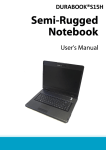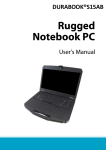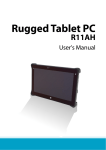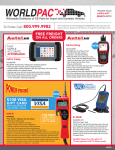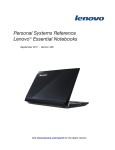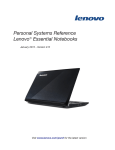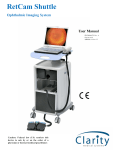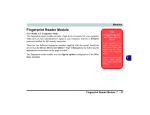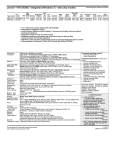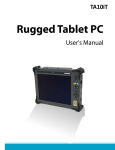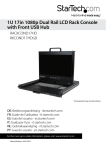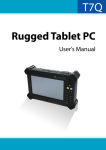Download Durabook SA14
Transcript
DURABOOK®SA14iT Table of Contents COPYRIGHT ................................................................................................. 4 REGULATORY STATEMENT ................................................................................. 4 Federal Communications Commission Statement .......................................................................................................... 4 Declaration of Conformity ............................................................................................................................................... 4 RF exposure warning........................................................................................................................................................ 5 Canada, Industry Canada (IC) Notices ........................................................................................................................... 5 Battery Disposal................................................................................................................................................................ 6 CLASS 1 LASER PRODUCT ........................................................................................................................................... 6 BEFORE YOU START ................................................................ 8 PACKAGE CONTENTS ...................................................................................... 8 COMPONENTS .............................................................................................. 9 Front View ......................................................................................................................................................................... 9 Back View ........................................................................................................................................................................ 10 Left View .......................................................................................................................................................................... 11 Right View........................................................................................................................................................................ 12 Rear View ........................................................................................................................................................................ 13 Status Indicators.............................................................................................................................................................. 14 GETTING STARTED ................................................................ 15 POWERING UP YOUR NOTEBOOK ...................................................................... 15 Connecting the AC Adapter............................................................................................................................................ 15 Using Battery Power ...................................................................................................................................................... 15 INSTALLING THE BATTERY............................................................................... 16 Charging the Battery....................................................................................................................................................... 16 Charging Time................................................................................................................................................................. 16 Checking the Battery Level............................................................................................................................................. 17 When to replace the Battery Pack .................................................................................................................................. 17 Removing the Battery...................................................................................................................................................... 18 Installing the Second Battery (Optional) ....................................................................................................................... 19 Checking the Battery Pack Power Level ....................................................................................................................... 20 STARTING YOUR NOTEBOOK ........................................................................... 21 Turning On Your Notebook............................................................................................................................................. 21 Shutting Down Your Notebook ....................................................................................................................................... 21 USING THE KEYBOARD .................................................................................. 22 USING THE QUICK MENU ............................................................................... 24 CONFIGURING THE SETUP MENU SETTINGS ........................................................ 25 Configuring Hotkey ........................................................................................................................................................ 26 Configuring Stealth Mode Button Setting ...................................................................................................................... 27 USING THE MEMORY CARDS ........................................................................... 28 Inserting a Memory Card ............................................................................................................................................... 28 Removing a Memory Card ............................................................................................................................................. 28 2 USING THE SMART CARD ............................................................................... 29 Inserting a Smart Card ................................................................................................................................................... 29 USING THE PC CARDS .................................................................................. 30 Inserting a PC Card........................................................................................................................................................ 30 USING THE OPTICAL DISK DRIVE ..................................................................... 31 Placing a Disc ................................................................................................................................................................. 31 USING THE FINGERPRINT SCANNER ................................................................... 32 Initial Setup ..................................................................................................................................................................... 32 CONNECTING TO WIRELESS CONNECTIONS ......................... 37 CONNECTING TO A WIRELESS WIDE AREA NETWORK (WWAN) ................................. 37 USING THE BIOS SETUP UTILITY .......................................... 39 BIOS SETUP MENU ..................................................................................... 39 STARTING THE BIOS SETUP UTILITY ................................................................. 39 NAVIGATING AND ENTERING INFORMATION IN BIOS............................................... 40 MAIN MENU .............................................................................................. 41 ADVANCED MENU ........................................................................................ 41 BOOT MENU .............................................................................................. 42 SECURITY MENU ......................................................................................... 42 SAVE & EXIT MENU ..................................................................................... 43 Preface Copyright Copyright© 2013. All rights reserved. No part of this user manual may be transmitted, stored in a retrieval system, or translated into any language or computer language, in any form or by any means, without the prior written permission of the manufacturer. Information is subject to change without prior notice. Regulatory Statement Federal Communications Commission Statement This equipment has been tested and found to comply with the limits for a Class B digital device, pursuant to Part 15 of the FCC Rules. These limits are designed to provide reasonable protection against harmful interference in a residential installation. This equipment generates, uses, and can radiate radio frequency energy and, if not installed and used in accordance with the instructions, may cause harmful interference to radio communications. However, there is no guarantee that interference will not occur in a particular installation. If this equipment does cause harmful interference to radio or television reception, which can be determined by turning the equipment off and on, the user is encouraged to try to correct the interference by one or more of the following measures: Reorient or relocate the receiving antenna. Increase the separation between the equipment and the receiver. Connect the equipment into an outlet on a circuit different from that to which the receiver is connected. Consult the dealer or an experienced radio/TV technician for help. Shielded interconnect cables and shielded AC power cable must be employed with this equipment to insure compliance with the pertinent RF emission limits governing this device. Changes or modifications not expressly approved by the system's manufacturer could void the user's authority to operate the equipment. Declaration of Conformity This device complies with part 15 of the FCC rules. Operation is subject to the following conditions: This device may not cause harmful interference This device must accept any interference received, including interference that may cause undesired operation. 4 Preface RF exposure warning This equipment must be installed and operated in accordance with provided instructions and must not be co-located or operating in conjunction with any other antenna or transmitter. End-users and installers must be provided with antenna installation instructions and transmitter operating conditions for satisfying RF exposure compliance. SAR Value: 0.317W/kg This device is operation in 5.15 – 5.25GHz frequency range, then restricted in indoor use only, Outdoor operations in the 5150~5250MHz is prohibit. This device is slave equipment, the device is not radar detection and not ad-hoc operation in the DFS band. Canada, Industry Canada (IC) Notices This Class B digital apparatus complies with Canadian ICES-003 and RSS-210. Operation is subject to the following two conditions: (1) this device may not cause interference, and (2) this device must accept any interference, including interference that may cause undesired operation of the device. Radio Frequency (RF) Exposure Information The radiated output power of the Wireless Device is below the Industry Canada (IC) radio frequency exposure limits. The Wireless Device should be used in such a manner such that the potential for human contact during normal operation is minimized. This device has been evaluated for and shown compliant with the IC Specific Absorption Rate (“SAR”) limits when installed in specific host products operated in portable exposure conditions. Canada, avis d'Industry Canada (IC) Cet appareil numérique de classe B est conforme aux normes canadiennes ICES003 et RSS-210. Son fonctionnement est soumis aux deux conditions suivantes : (1) cet appareil ne doit pas causer d'interférence et (2) cet appareil doit accepter toute interférence, notamment les interférences qui peuvent affecter son fonctionnement. Informations concernant l'exposition aux fré quences radio (RF) La puissance de sortie émise par l’appareil de sans fil est inférieure à la limite d'exposition aux fréquences radio d'Industry Canada (IC). Utilisez l’appareil de sans fil de façon à minimiser les contacts humains lors du fonctionnement normal. 5 Preface Ce périphérique a été évalué et démontré conforme aux limites SAR (Specific Absorption Rate – Taux d'absorption spécifique) d'IC lorsqu'il est installé dans des produits hôtes particuliers qui fonctionnent dans des conditions d'exposition à des appareils portables. Battery Disposal THIS PRODUCT CONTAINS A LITHIUM-ION OR NICKEL-METAL HYDRIDE BATTERY. IT MUST BE DISPOSED OF PROPERLY. CONTACT LOCAL ENVIRONMENTAL AGENCIES FOR INFORMATION ON RECYCLING AND DISPOSAL PLANS IN YOUR AREA. CLASS 1 LASER PRODUCT LASERSCHUTZKLASSE 1 PRODUKT TO EN60825 CAUTION: THIS APPLIANCE CONTAINS A LASER SYSTEM AND IS CLASSIFIED AS A "CLASS 1 LASER PRODUCT.” TO USE THIS MODEL PROPERLY, READ THE INSTRUCTION MANUAL CAREFULLY AND KEEP THIS MANUAL FOR FUTURE REFERENCE. IN CASE OF ANY TROUBLE WITH THIS MODEL, PLEASE CONTACT YOUR NEAREST "AUTHORIZED SERVICE STATION.” TO PREVENT DIRECT EXPOSURE TO THE LASER BEAM, DO NOT TRY TO OPEN THIS ENCLOSURE. ANNEX IV Symbol for the marking of electrical and electronic equipment The symbol indicating separate collection for electrical and electronic equipment consists of the crossed-out wheeled bin, as shown below. The symbol must be printed visibly, legibly and indelibly. 6 Preface CAUTION FOR ADAPTER THE SA14iT SEMI-RUGGED NOTEBOOK IS FOR USE WITH DEDICATED AC ADAPTER (DC +19V, 90W). BATTERY SAFETY DANGER OF EXPLOSION IF BATTERY IS INCORRECTLY REPLACED. REPLACE ONLY WITH THE SAME OR EQUIVALENT TYPE RECOMMENDED BY THE MANUFACTURER. DISPOSE OF USED BATTERIES ACCORDING TO THE MANUFACTURER'S INSTRUCTIONS. CAUTION FOR RJ-45 The RJ-45 jack is not used for telephone line connection. 7 Before You Start Before You Start Congratulations on your purchase of this notebook. This rugged notebook is portable and provides users with maximum mobile computing experience in a wide range of working environments. Before you begin using your notebook, read this chapter to familiarize yourself with the main components installed in the system. Package Contents If any of following items is damaged, please contact your retailer. Notebook Power cord DC 19V 90W power adapter Standard 9-cell Li-ion Battery 8 NOTE The pictures are for reference only, actual items may slightly differ. Before You Start Components Front View No. Item No. 9 Item 1 LCD cover latch Waterproof Keyboard 2 1.3M CCD camera 10 Touch pad 3 Display screen 11 Touch pad button 4 Stealth mode/night vision button 12 Fingerprint scanner 5 Quick menu button 13 Device Indicators (Power, Wireless, HDD, Caps Lock, Num lock, Battery) 6 Programmable button 14 Speaker 7 RF button 15 Microphone 8 Power button 9 Before You Start Back View No. 10 Item 1 Docking connector 2 Battery latch 3 HDD latch release button 4 HDD latch 5 6-cell Battery / 2.5” SATA HDD compartment Before You Start Left View No. Item 1 ODD cover latch 2 Eject button 3 Pin Hole Eject 4 USB 3.0 ports (x2) 5 Microphone jack 6 Earphone jack 11 Before You Start Right View No. 12 Item 1 Battery compartment 2 Battery latch 3 PC Card slot 4 Card reader 5 USB 2.0 ports (x2) 6 RJ-45 port 7 Smart card reader Before You Start Rear View No. Item 1 Kensington lock slot 2 HDMI output port 3 VGA port 4 RS-232 port 5 DC-in jack 13 Before You Start Status Indicators The status indicators in the bottom left corner of the notebook light up when a particular function of the notebook is active. Each indicator is marked with a symbol. Icon 14 Item Description Power The LED always lights on (blue) when the system is running. When the system is in sleep mode, the LED blinks. RF Indicate the status of RF (WLAN, WWAN, or Bluetooth) communication. The LED always lights on (blue) when the function is enabled. HDD A blinking HDD LED indicates HDD activity (data is being read or written). Num Lock Lights on when Num Lock is activated. Caps Lock Lights on when Caps Lock is activated. Battery Indicate the battery status: Green light means the battery is fully charged or the charging current is 0 for more than 3 minutes with the battery capacity higher than 95%. Blinking green light means the system is calibrating the battery. Orange light means the battery is being charged. Blinking orange light means the battery is being charged but the battery temperature is out of charging range (0~60ºC), the battery is being charged for more than 10 hours, or the charging current is 0 for more than 3 minutes with the battery capacity lower than 85%. Blinking red light means the battery power is low (less than 7%). Getting Started Getting Started This chapter will guide you on how to use your notebook. Powering Up Your Notebook Your notebook can be powered up using the AC adapter or the Lithium-ion battery. Connecting the AC Adapter The AC adapter powers up your notebook and charges the battery. 1. Connect the AC adapter to the DC-in jack of your notebook. 2. Connect the AC adapter to the power cord. 3. Plug the power cord to an electrical outlet. Using Battery Power 1. Install a charged battery in the battery compartment. 2. Remove the AC adapter (if plugged). Your notebook will automatically use the battery power. NOTE If you are using the notebook with the battery power for the first time, be sure that the battery is fully charged before you operate the notebook. 15 Getting Started Installing the Battery To install the battery, follow the steps below: 1. Insert the battery to the battery compartment. 2. Push completely until the battery locks into place. 3. Slide the battery latch to the lock position to secure the battery. Charging the Battery The Lithium-ion battery is not fully-charged upon purchase. To charge the battery, follow the steps below: 1. Install the battery to your notebook. See procedures above. 2. Connect the AC adapter to the DC-in jack of your notebook. 3. Connect the AC adapter to the power cord. 4. Plug the power cord to an electrical outlet. Charging Time Number of battery pack Charging duration (at 25ºC) 1 2 (*optional) 4 hours 7 hours 16 NOTE The charging time may be longer if you are using your notebook while charging the battery. Getting Started CAUTION DO NOT charge the battery if the temperature is below 0ºC or higher than 60ºC. Use only the supplied AC adapter. Using other AC adapters may damage the battery or your notebook. Checking the Battery Level It is important that you monitor the battery status regularly to ensure you do not run out of power at a critical moment. To check the remaining battery power, double tap the battery icon in the system tray. The battery screen appears: When to replace the Battery Pack The battery performance gradually decreases over time and usage. We recommend you to replace your battery pack after 18 to 24 months of usage. 17 Getting Started Removing the Battery To remove the battery, follow the steps below: 1. Slide the battery latch to the unlock position. 2. Slide the battery latch to the right (as shown in the illustration) and hold it in place. Then pull the battery out to disengage it from its compartment. 3. Remove the battery out of the battery compartment. 18 Getting Started Installing the Second Battery (Optional) To remove the second battery, follow the steps below: 1. Align and insert the second battery to the hard disk compartment. 2. Press and hold the HDD latch release button to slide the HDD latch to the lock position. 19 Getting Started Checking the Battery Pack Power Level You can check the battery level by pressing the Battery Check button. The remaining battery power is indicated by the four Green LEDs. Green LED status Battery Capacity Status 1st LED lights up 1st and 2nd LED light up 0% ≦ 25% 25% ≦50% 1st, 2nd, and 3rd LED light up 50% ≦75% All four LEDs light up 75% ≦100% 20 Getting Started Starting Your Notebook Turning On Your Notebook 1. To open the display panel, unlock the LCD Cover latch to open the LCD. 2. Lift the cover lid up to upright position. 3. Press the button until the Power LED lights up. Shutting Down Your Notebook It is important to properly shut down your notebook to avoid the loss of unsaved data. To shut down your notebook, do the following: Tap Start > Shut down. Wait for your notebook to turn off power completely before removing the power source (if necessary). 21 Getting Started Using the Keyboard No. Keys Description Function keys These function keys are used to perform designated tasks. The tasks for each key may vary from one application to another. [Fn] Press the [Fn] key in combination with other keys to execute a command. [Fn] + F1 Toggles the touch pad to on/off. [Fn] + F2 Switches to suspend mode. [Fn] + F5 Toggles between LCD, External display, or both. [Fn] + F6 Decreases the brightness level. [Fn] + F7 Increases the brightness level. [Fn] + F8 Decreases the volume by one level. [Fn] + F9 Increases the volume by one level. [Fn] + F10 Turns on or mutes the volume. [Fn] + F12 Toggles the keyboard backlight on/off. (Backlight keyboard is optional) 3 Windows key Press to display the Start menu. This action is the same as clicking the Start icon. 4 Numeric keypad Press the Num lock key to activate the numeric keypad. Press the keys on the numeric keypad to enter numbers or operands as you would on a calculator. 1 2 22 Getting Started 5 Application key Press to display an application shortcut menu. This action is the same as right-clicking a mouse button. 23 Getting Started Using the Quick Menu Press the button to enter the Quick menu: 1 2 3 4 5 No. 1 6 Item Airplane mode Description Click the icon to enable/disable airplane mode. NOTE When the Airplane mode is enabled, the wireless network (WLAN and WWAN), and Bluetooth will be automatically disabled. 2 WLAN Click the icon to enable/disable the Wi-Fi (WLAN) function. 3 WWAN Click the icon to enable/disable the WWAN function. 4 Bluetooth Click the icon to enable/disable the Bluetooth function. 5 Setup Click the respective tab to set hotkey and stealth mode button settings. For details, refer to “Configuring the SETUP Menu Settings”. 24 Getting Started No. 6 Item Description Information Click the icon to view the battery charge cycle, Bios version, EC version, and Quick Menu version. NOTE If the icon is gray (i.e. ), this indicates the current function is disabled. Configuring the SETUP Menu Settings In Quick Menu, you can set the following settings via Setup menu: b a a. Programmable button (Hotkey) b. Stealth mode button 25 Getting Started Configuring Hotkey Click the Programmable Button tab to configure the P function button. To assign an application to the P button, do the following: I. Select Function setting for Hotkey. II. Click the folder icon ( ) to set up an application for the P button. III. Select the desired application and tap Open. 26 Getting Started Configuring Stealth Mode Button Setting Click the Stealth Mode Button tab to specify the Stealth mode button function. There are two available functions: Stealth mode: Turn off the LCD backlight, LEDs (LED indicators and keypad backlight), speakers, camera flash, and RF devices. Night vision mode: Adjust the brightness of the LCD under 1.7 nits and turn off the LEDs (LED indicators and keypad backlight) and camera flash. 27 Getting Started Using the Memory Cards Your notebook supports different types of memory cards to provide faster data transfer. Supported types are as follows: SD card SDHC card Mini-SD card (with adapter) Inserting a Memory Card 1. Pull to open the I/O port cover. 2. With the label side down, push the memory card into the memory card slot until it clicks into place. Removing a Memory Card It is important to remove the memory card properly. Improper removal may cause the data in the memory card to be corrupted and your notebook to malfunction. To properly remove the memory card, follow the steps below: 1. Tap the removable disk icon on the system tray. 2. Tap Eject SD Disk Device. The system confirms that the device can be safely removed. 3. Push the memory card to eject it. 4. Pull the card out from the slot. 28 Getting Started Using the Smart Card Inserting a Smart Card 1. Pull to open the I/O port cover. 2. Insert a smart card into the smart card slot. 29 Getting Started Using the PC Cards Inserting a PC Card 1. Pull to open the I/O port cover. 2. Insert a PC card firmly into the PC card slot until it clicks into the connector. NOTE 30 The SA14iT semi-rugged notebook only supports 32-bit PCMCIA card. Getting Started Using the Optical Disk Drive You can use to play or record DVD or CD disc. Placing a Disc 1. Slide latch to the right to open the ODD cover. 2. Press Eject button to eject the tray. 3. Place the disc on the tray. 4. Close the disc tray. Manual Ejection If the Eject button fails to work properly, insert a paper clip into the Pin Hole Eject to open the tray. NOTE Be sure that the notebook is turned off before performing the manual ejection. 31 Getting Started Using the Fingerprint Scanner This notebook supports BioExcess application that enables you to protect your notebook from unauthorized access, hide the encrypted private files, set the autologin to your favorite websites, or launch an application by simply swiping your finger on the fingerprint scanner. Initial Setup 1. Swipe your finger on the fingerprint scanner. The Initial Wizard appears on the screen. 2. Tap Next to continue. 3. Swipe your finger on the fingerprint scanner to practice enrollment or tap Next to skip this step. 32 Getting Started 4. Create a Windows password and click Next to continue. You will be prompted to enter this password every time you log on. 5. Click one box to enroll your fingerprint and click Next to continue. 33 Getting Started 6. Swipe your selected finger on the fingerprint scanner for three times. 7. After you have completed the enrollment, a “Succeeded” message appears on the screen. 34 Getting Started 8. Repeat step 5~7 to enroll another fingerprint or click Next to continue. 9. The Secure Drive configuration may take a while to complete. 35 Getting Started 10. NOTE You can also launch the BioExcess application by tapping Start > BioExcess. 11. 36 Click Finish to complete the initial setup of BioExcess. To directly launch BioExcess application, click Launch Control Center checkbox. Tap the respective option and configure the necessary settings. Connecting to Wireless Connections Connecting to Wireless Connections You can connect your notebook to a wireless local area network, WWAN, or Bluetooth. Before using a wireless built-in device, you need to turn the respective built-in wireless functions on. Connecting to a Wireless Wide Area Network (WWAN) With WWAN function, it allows your notebook to connect to the Internet using mobile or cellular data networks. To enable the function, follow the steps below: 1. Insert a valid SIM card into the SIM card slot. 2. Press the button to open the Quick menu. 3. Tap the WWAN icon ( WWAN function. ) to turn on the 4. Launch AirCard Watcher application. On Windows desktop, tap “AirCard Watcher” ( ). Tap Start > AirCard Watcher. 5. Tap Connect to enable the Internet connection via mobile data network. 37 Connecting to Wireless Connections 6. To disconnect the connection, tap Disconnect. 38 NOTE Turn off the notebook before you insert the SIM card. Using the BIOS Setup Utility Using the BIOS Setup Utility Your notebook has a BIOS setup utility which allows you to configure important system settings, including settings for various optional functions of the notebook. This chapter explains how to use the BIOS setup utility. BIOS Setup Menu The BIOS Setup Utility allows you to configure your notebook basic settings. When you turn your notebook on, the system reads this information to initialize the hardware so that it can operate correctly. Use the BIOS setup utility to change your notebook start-up configuration. For example, you can change the security and power management routines of your system. Starting the BIOS Setup Utility You can only enter the BIOS setup utility as the notebook is booting, that is between the time you turn on the notebook and before the Windows interface appears. If your notebook is already on, shut down your notebook completely (power off) and restart it and then press the F2 button to enter the setup utility. 39 Using the BIOS Setup Utility Navigating and Entering Information in BIOS Use the following keys to move between fields and to enter information: Keyboard Enter +/F1 F2 F3 F4 Esc Description Selects screen. Moves up/down to select items. Confirms the selection and enters the selected menu screen. Changes an option for the selected items. Displays the Help screen. Invokes the previous values. Loads optimized default values. Saves the changes and exits Setup. Exits any section. If you wish to exit the BIOS utility without saving changes or go to the main menu, then press this key. Users are allowed to enter new values to replace the default settings in certain fields, and the rest of the fields are specified by system default parameters and cannot be modified by users. Reverse the attribute of the main options and press the Enter button to enter into the submenu. Press the Esc button to return to the previous configuration page. 40 Using the BIOS Setup Utility Main Menu The Main menu displays the system overview information about BIOS version, system information, and total memory size. You can also set the system date and time. Advanced Menu The Advanced menu allows you to select SATA mode, set the device to wake up on LAN when the AC power adapter is connected, enable/disable VPro function, calibrate fan and battery, and configure RF, Intel Rapid Start Technology, and Trusted Computing settings. 41 Using the BIOS Setup Utility Boot Menu The Boot menu allows you to configure the boot settings and boot sequence. Security Menu The Security menu allows you to set or change the Administrator and User passwords, configure Secure Boot settings, and set HDD password. 42 Using the BIOS Setup Utility Save & Exit Menu The Save & Exit menu allows you to save or discard the changes, restore the default values for all setup options before leaving the BIOS Setup Menu, and configure boot override sequence. 43











































